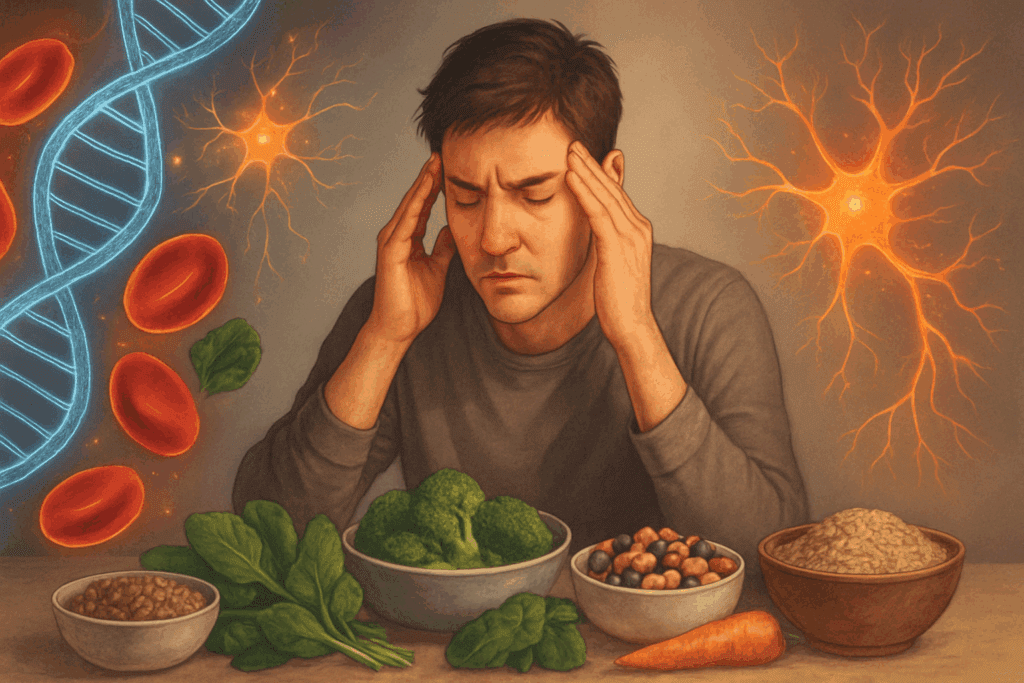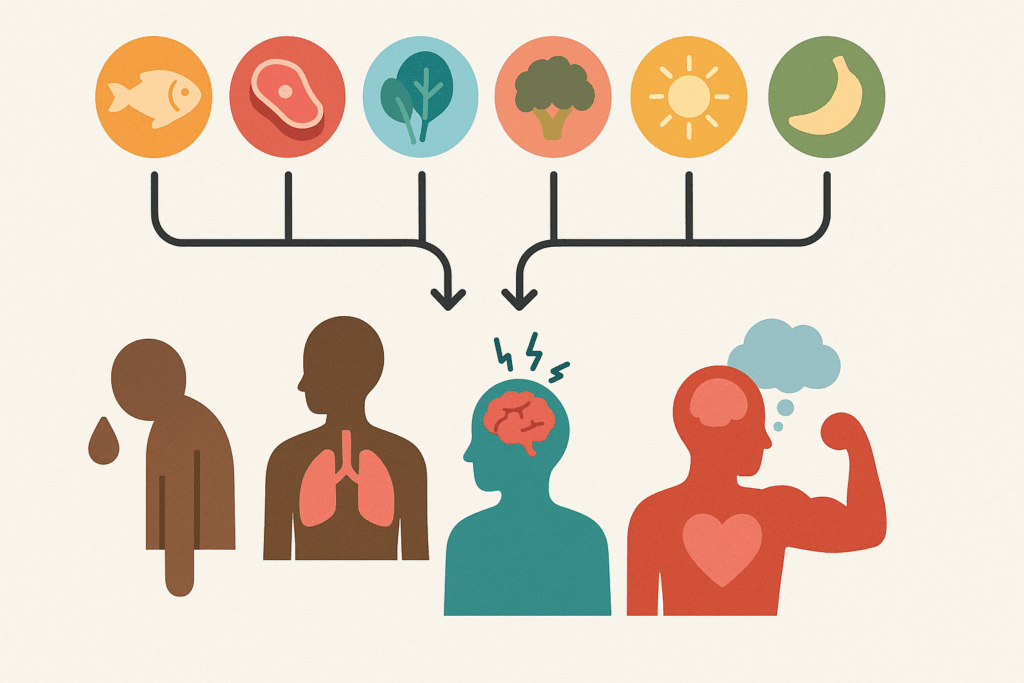Understanding the Link Between Vitamin Deficiency and Common Yet Misleading Symptoms
Fatigue and shortness of breath are symptoms most people associate with stress, overexertion, or a respiratory condition like asthma or anemia. However, in many medically overlooked cases, these symptoms are rooted in something as simple—and as serious—as a nutritional deficiency. The question of what vitamin deficiency can cause breathing problems is not just academic; it’s an important clinical concern that nutritionists and physicians are increasingly seeing in practice. The same goes for understanding what deficiency causes headaches and fatigue, a frustrating and often persistent condition that patients struggle to resolve with conventional treatments. What if the answer is not in your lungs or your lifestyle—but in your diet?
In an age of processed foods, irregular eating habits, and even health-conscious restrictive diets, vitamin and mineral deficiencies are quietly on the rise. Yet because their symptoms mimic more serious or better-known disorders, they are often misdiagnosed or missed entirely. A deeper understanding of the biological role vitamins play in energy metabolism, oxygen transport, and neurological function can illuminate why these gaps in nutrition have such a profound impact on how we breathe, think, and feel. This article draws from expert medical knowledge, clinical studies, and nutritional science to explore how specific deficiencies—especially in the B vitamins, iron, magnesium, and others—can contribute to unexplained fatigue and respiratory symptoms. We’ll also discuss how to identify these deficiencies, correct them, and prevent them from recurring, with practical insights that can support wellness through better diet and smarter supplementation.
You may also like: Macronutrients vs Micronutrients: What the Simple Definition of Macronutrients Reveals About Your Diet and Health

Why Vitamin B12 Is Often the Culprit in Breathing and Energy Issues
Of all the nutrients linked to respiratory symptoms and fatigue, vitamin B12 stands out. Known for its essential role in red blood cell production and neurological function, B12 is often the missing puzzle piece in cases where patients complain of persistent tiredness, dizziness, and breathlessness, even when their lungs and heart check out as healthy. So, what vitamin deficiency can cause breathing problems? In many instances, it’s B12, especially among older adults, vegetarians, vegans, or individuals with gastrointestinal issues that impair absorption.
Vitamin B12 helps the body create red blood cells, which carry oxygen throughout the body. Without sufficient B12, the body cannot produce enough healthy red blood cells, leading to a condition called megaloblastic anemia. This type of anemia doesn’t just cause general tiredness—it can lead to breathlessness upon minimal exertion, heart palpitations, and even fainting spells. In a clinical sense, this is where the experience of a vitamin deficiency mirrors more alarming cardiovascular or pulmonary conditions.
What makes B12 deficiency particularly challenging is that it often develops slowly, over months or years, making the symptoms seem unrelated or “normal” aging. In reality, the inability to climb stairs without gasping or the constant fog of low energy may have less to do with fitness and more to do with a B-vitamin imbalance. For people asking what deficiency causes headaches and fatigue, B12 again emerges as a prime suspect, particularly when the headaches are accompanied by tingling in the hands or feet, memory issues, or irritability—signs of neurological involvement.
Another complication is that B12 absorption depends on intrinsic factor, a protein produced in the stomach. Individuals with atrophic gastritis, Crohn’s disease, celiac disease, or those taking long-term acid-reducing medications may struggle to absorb this nutrient even if their dietary intake appears adequate. In such cases, B12 injections or sublingual supplements are often recommended to bypass the gastrointestinal tract entirely.

Iron Deficiency and Oxygen Transport: A Direct Pathway to Breathlessness
When it comes to fatigue and breathlessness, iron deficiency is one of the most direct and physiologically grounded explanations. Iron is a key component of hemoglobin, the protein in red blood cells responsible for transporting oxygen from the lungs to the rest of the body. A deficiency in iron disrupts this essential process, leading to iron-deficiency anemia—a condition that affects millions of people worldwide, particularly menstruating women, pregnant individuals, and those with chronic gastrointestinal blood loss.
For those wondering what vitamin deficiency can cause breathing problems, iron deficiency should be high on the list, even though technically iron is a mineral. It fits the broader context of nutrient deficiencies affecting oxygen utilization. When iron levels drop, cells and tissues don’t receive the oxygen they need, forcing the heart and lungs to work harder. This leads to labored breathing, especially during physical activity, as the body struggles to compensate for the oxygen deficit.
The fatigue associated with iron deficiency can be overwhelming and persistent. People often describe it as a kind of physical heaviness that sleep does not relieve. When accompanied by headaches, poor concentration, and cold hands and feet, the question shifts to what deficiency causes headaches and fatigue, and again, iron deficiency anemia presents a strong case.
Diagnosing iron deficiency is relatively straightforward with blood tests such as serum ferritin, hemoglobin, and hematocrit levels. However, correcting it isn’t just about taking iron pills. The body’s ability to absorb iron is influenced by many factors, including the presence of vitamin C, the form of iron (heme vs. non-heme), and whether the person is consuming substances like calcium or tannins from tea and coffee that inhibit absorption. Therefore, dietary strategies must be tailored, and supplementation monitored to ensure effective and sustainable correction.

The Overlooked Role of Magnesium in Energy and Respiratory Health
Although magnesium is often discussed in relation to muscle cramps or sleep support, its importance in cardiovascular and respiratory health is profound and underappreciated. Magnesium plays a vital role in ATP production, muscle function—including the muscles that support breathing—and nerve signaling. A deficiency can lead to symptoms that mimic fatigue syndromes or chronic stress, making it easy to overlook.
When exploring what deficiency causes headaches and fatigue, magnesium emerges as a quiet but potent contributor. Low magnesium levels can lead to vascular changes that trigger migraines, while also impairing energy metabolism at a cellular level. Individuals with low magnesium often report muscle weakness, irritability, insomnia, and generalized fatigue—all symptoms that can overlap with depression, chronic fatigue syndrome, or even early signs of cardiovascular disease.
In terms of breathing, magnesium acts as a bronchodilator, meaning it helps open up the airways. This is why intravenous magnesium is sometimes used in emergency rooms to treat acute asthma attacks. Chronically low levels, while not producing such dramatic symptoms, may still contribute to shallow breathing, chest tightness, or a sense of reduced lung capacity. For those exploring what vitamin deficiency can cause breathing problems, magnesium deficiency—though technically a mineral issue—should not be overlooked, especially in individuals with diabetes, high alcohol intake, or gastrointestinal disorders.
Unfortunately, magnesium is one of the nutrients most depleted by modern farming practices and food processing. As a result, even those eating a “healthy” diet may not be getting enough. Supplementation or dietary adjustments with magnesium-rich foods like leafy greens, nuts, seeds, and legumes can make a significant difference in symptoms within weeks, but must be approached thoughtfully to avoid gastrointestinal upset or interactions with medications.

Vitamin D, Mitochondrial Function, and the Puzzle of Chronic Fatigue
Vitamin D is best known for its role in bone health, but emerging research connects it to energy regulation, immune modulation, and even mitochondrial function. This makes it a nutrient of high interest in cases of unexplained fatigue. Although less directly associated with respiratory function than iron or B12, a deficiency in vitamin D can contribute to overall feelings of exhaustion, muscle weakness, and a compromised immune response that may indirectly affect breathing—particularly in the context of respiratory infections.
The connection between vitamin D and fatigue is supported by observational studies showing that low levels are common in individuals with chronic fatigue syndrome, fibromyalgia, and autoimmune conditions. While causation cannot be definitively proven in all cases, interventional studies have shown that correcting a vitamin D deficiency can lead to notable improvements in energy, mood, and muscle performance. So when considering what deficiency causes headaches and fatigue, vitamin D may not be the first nutrient suspected—but it is increasingly recognized as a silent driver of low energy, poor sleep quality, and diffuse pain that contributes to headache syndromes.
Vitamin D also supports respiratory health by modulating inflammation and enhancing the body’s defense against respiratory pathogens. Inadequate levels may lead to more frequent infections, prolonged recovery times, and worsened asthma or COPD symptoms. Although it is not typically framed in conversations around what vitamin deficiency can cause breathing problems, low vitamin D can contribute to a downward spiral of poor immune function and inflammation that worsens respiratory resilience over time.
Blood testing for 25-hydroxy vitamin D levels is the standard for diagnosing deficiency, with optimal ranges generally considered to be between 30 and 50 ng/mL. Supplementation must be individualized, as excessive vitamin D can lead to toxicity. Pairing vitamin D with magnesium and vitamin K2 is often recommended for optimal absorption and function.

Folate and Vitamin B6: Hidden Players in Energy and Respiratory Support
Folate (vitamin B9) and vitamin B6 are less talked about than B12, but they play equally crucial roles in red blood cell formation, nervous system function, and oxygen transport. A deficiency in either can lead to anemia and neurological symptoms that overlap with the classic indicators of B12 deficiency. Folate deficiency is particularly common among individuals with poor dietary intake, alcohol use disorder, or those taking certain medications like methotrexate or antiepileptics.
Folate is essential for DNA synthesis and cellular replication. Without enough of it, the bone marrow cannot produce healthy red blood cells, leading to megaloblastic anemia. People often ask what deficiency causes headaches and fatigue, and folate deserves a place on that shortlist. Headaches may result from reduced oxygen delivery to the brain, while fatigue and cognitive slowing are hallmarks of folate-related anemia.
Vitamin B6, meanwhile, contributes to hemoglobin production and is required for the synthesis of neurotransmitters like serotonin and dopamine. Its deficiency can produce symptoms ranging from irritability and depression to numbness, fatigue, and a weakened immune system. Both folate and B6 are interdependent with B12 in the methylation cycle, a process essential to energy metabolism and detoxification.
While folate and B6 are found in a variety of foods, including leafy greens, legumes, and animal proteins, absorption and demand can vary widely. Genetic variations in enzymes like MTHFR can impair folate metabolism, increasing the need for active forms like methylfolate. Correcting these deficiencies is often part of a broader functional medicine approach to addressing persistent fatigue and mood symptoms that have not responded to other interventions.

Frequently Asked Questions (FAQ)
1. Can vitamin deficiencies mimic anxiety or panic attacks due to shortness of breath?
Yes, and this is more common than many people realize. When people experience shortness of breath, racing heartbeats, or dizziness, these symptoms are often misattributed to anxiety disorders. However, in some cases, especially in individuals with no prior history of mental health conditions, a deeper look reveals that what vitamin deficiency can cause breathing problems may also provoke symptoms similar to a panic attack. For instance, low levels of vitamin B12 or iron can reduce oxygen delivery to the brain and muscles, triggering sensations of suffocation or tightness in the chest. This physiological stress response may be misdiagnosed as anxiety, especially when psychological symptoms are absent or secondary to the physical experience.
2. How do vitamin deficiencies impact the quality of sleep and morning fatigue?
Although sleep disorders are often treated independently from nutrition, they can be deeply connected. Deficiencies in magnesium and vitamin D are particularly known to affect circadian rhythm and melatonin production. This can result in difficulty falling asleep, fragmented rest, or waking up still feeling tired. People who wonder what deficiency causes headaches and fatigue often overlook that poor sleep due to nutrient gaps can exacerbate both. Moreover, chronic fatigue in the morning, despite a full night of sleep, may be a sign that your body’s mitochondrial function is compromised—something linked to low levels of B vitamins and CoQ10, a compound influenced by nutritional status.
3. Are there environmental or occupational factors that increase the risk of vitamin-related breathing problems?
Yes, specific environments and occupations can increase nutrient depletion or absorption issues, making deficiencies more likely. For example, individuals working in high-stress professions or shift work are more prone to low magnesium and B12 due to increased metabolic demand and irregular eating habits. In polluted urban areas or indoor-only jobs, vitamin D deficiency is prevalent due to lack of sunlight exposure. This can be relevant for individuals asking what vitamin deficiency can cause breathing problems, as vitamin D plays a regulatory role in lung function and inflammation. Additionally, those exposed to certain industrial chemicals may experience malabsorption syndromes or increased oxidative stress, further exacerbating their need for antioxidant nutrients and trace minerals.
4. What is the relationship between nutrient deficiencies and post-viral fatigue or long COVID?
Emerging research suggests that nutritional status may influence both the risk of developing long COVID and the severity of post-viral fatigue syndromes. After an acute infection, the body’s demand for nutrients such as zinc, B12, folate, and vitamin D increases as it attempts to repair damaged tissues and regulate the immune response. Patients with existing deficiencies may find that recovery takes much longer and that symptoms like breathlessness and brain fog persist. Those exploring what deficiency causes headaches and fatigue in the context of long COVID may be surprised to learn that immune-modulating nutrients like magnesium and vitamin C also play indirect roles in restoring vascular and mitochondrial health post-infection. Clinical trials are underway to investigate whether supplementing these nutrients can accelerate recovery.
5. Can medications interfere with vitamin absorption and cause fatigue or breathing symptoms?
Absolutely, and this interaction is often overlooked during routine medical evaluations. Commonly prescribed drugs such as metformin (for diabetes), proton pump inhibitors (for acid reflux), and certain antibiotics can interfere with B12 and magnesium absorption. Over time, this interference may manifest as unexplained fatigue, weakness, or difficulty breathing during physical activity. People who regularly use these medications and wonder what vitamin deficiency can cause breathing problems should discuss with their physician whether long-term nutrient monitoring is appropriate. Anticonvulsants, birth control pills, and cholesterol-lowering statins are also known to deplete key vitamins like B6, folate, and CoQ10, which can further impact energy production.
6. How do nutrient deficiencies affect brain oxygenation and cognitive fatigue?
Fatigue is not always physical. Cognitive fatigue—difficulty focusing, memory lapses, and mental fog—is increasingly being linked to deficiencies in nutrients that support brain oxygenation and neurotransmitter synthesis. Individuals searching for what deficiency causes headaches and fatigue often experience mental symptoms before physical ones. Iron deficiency, for example, reduces hemoglobin levels, leading to poor oxygen transport to the brain. Similarly, B12 and folate deficiencies interfere with myelin production and dopamine synthesis, resulting in cognitive sluggishness. Addressing these deficiencies can improve both clarity of thought and overall energy, especially in students, professionals, and older adults.
7. Are there gender-specific factors in how deficiencies manifest as fatigue or breathing issues?
Yes, biological sex can influence how nutrient deficiencies present and which symptoms predominate. For example, menstruating women are at greater risk for iron-deficiency anemia, which is one of the most direct answers to the question of what vitamin deficiency can cause breathing problems. In contrast, postmenopausal women and older men may be more prone to B12 and vitamin D deficiencies due to changes in gastric acidity and reduced skin synthesis, respectively. These differences can result in distinct symptom profiles—women may report shortness of breath and dizziness, while men might present more often with fatigue and cognitive decline. Hormonal fluctuations also interact with nutrient pathways, particularly in relation to thyroid and adrenal function, further complicating the picture.
8. What are early signs of a deficiency before severe fatigue or breathing problems develop?
Many deficiencies begin subtly, and recognizing the earliest signs can prevent more serious outcomes. For instance, tingling in the extremities, occasional dizziness, brittle nails, or reduced exercise tolerance can all indicate developing nutritional gaps. People who eventually come to ask what deficiency causes headaches and fatigue may recall months of minor symptoms like mood swings, low-grade depression, or poor cold tolerance before their energy noticeably dropped. Early-stage B6 deficiency, for example, might show up as skin rashes or a sore tongue, while magnesium deficiency might begin with eye twitches or muscle cramps. Recognizing and treating these signs promptly with dietary adjustments or targeted supplementation can prevent downstream complications.
9. Is it possible to have multiple overlapping deficiencies contributing to your symptoms?
Yes, and this is more common than having an isolated deficiency. Nutrient imbalances often cluster together, especially in individuals with restrictive diets, gastrointestinal disorders, or chronic illness. For instance, someone asking what vitamin deficiency can cause breathing problems may actually be dealing with both low iron and suboptimal B12, creating a compounded effect on oxygen transport and muscular endurance. Similarly, someone with persistent headaches and poor focus may find that what deficiency causes headaches and fatigue isn’t just one answer, but a combination of folate, B6, and magnesium issues. Functional medicine practitioners often recommend comprehensive nutrient panels for this reason, as treating one deficiency without addressing coexisting gaps can limit recovery.
10. Can lifestyle changes reverse fatigue or breathing symptoms caused by deficiencies?
In many cases, yes—especially if intervention happens early. Simple changes such as increasing dietary diversity, reducing processed foods, and timing nutrient intake with other supportive compounds (like pairing iron with vitamin C) can restore balance quickly. For those who ask what vitamin deficiency can cause breathing problems, regular exercise that promotes blood oxygenation—combined with repletion of key nutrients—can help reverse mild symptoms in a matter of weeks. Likewise, people struggling with what deficiency causes headaches and fatigue often benefit from not just supplements, but also hydration, better sleep hygiene, and reduced alcohol or caffeine intake. Addressing deficiencies holistically, rather than relying solely on pills, tends to yield better long-term outcomes and fewer relapses.
Final Thoughts: Recognizing the Warning Signs and Responding with Nutritional Intelligence
When patients experience persistent fatigue, breathlessness, or frequent headaches, the typical diagnostic pathway leads to investigations of the lungs, heart, and perhaps mental health. But a growing body of evidence supports a more foundational line of inquiry: is the body lacking the nutritional tools it needs to function optimally? Understanding what vitamin deficiency can cause breathing problems and investigating what deficiency causes headaches and fatigue can shift the clinical conversation away from symptom suppression and toward root cause resolution.
Vitamin B12, iron, magnesium, vitamin D, folate, and B6 are not simply “supportive” nutrients—they are integral to the basic processes of oxygen transport, energy generation, and neurological balance. When they are missing, the consequences reverberate through every system of the body. What appears to be anxiety might be B12 deficiency. What feels like chronic burnout could be iron-deficiency anemia. What’s mistaken for asthma might stem from low magnesium or vitamin D levels. And headaches that don’t respond to painkillers may be signaling a deeper issue with folate or B6.
Fortunately, identifying and addressing these deficiencies is within reach. Routine blood tests, symptom tracking, and nutritional consultation can uncover deficiencies that may otherwise go unrecognized. Supplementation—when properly tailored—can dramatically improve quality of life, often in a matter of weeks. But the solution is not one-size-fits-all. Personalized care, guided by clinical expertise and supported by dietary improvements, remains essential.
Further Reading:
7 Common Nutrient Deficiencies: Know the Signs


